- Home
- Nick Carter
Eighth Card Stud Page 13
Eighth Card Stud Read online
Page 13
Itemizing didn't give me a pretty picture. My hands were bound behind my back with a short length of rope. My feet were fastened to a steel beam so thick I couldn't hope to bend it in a million years. The heaviness of the air, such as that which precedes a spring shower, made my nose wrinkle. I sneezed. The ozone in the air made my eyes water and tickled at the back of my throat. I sneezed again.
Tensing my stomach muscles pulled me to a sitting position. I surveyed the bunker. The first item I noticed gave me a cold, sinking feeling. The carriage bolts on the laser cannon had been removed. Loose wires, ripped out in haste, testified that Edward George's mission had succeeded and mine had failed. The vital portion of the laser weapon, the switching device that made the difference between a toy and a deadly weapon of war, was stolen.
I tried rubbing my feet up and down against the steel beam hoping to abrade the ropes. It didn't work. I twisted double and almost succeeded in getting my fingers onto the knots securing my feet. Almost. The old saying, "An inch is as good as a mile," proved all too true in this case.
The crackling of high voltage electricity became deafening. I noticed that most of the meters on the control panel pegged out on the high end of the scales. Several of the slender needles had actually bent around the pegs, indicating a sudden and catastrophic overload. Something deadly was occurring in the bunker, and I was caught right in die middle of it, bound and helpless.
My fears were fed when the radio snarled, amid a flurry of static, " readings show dangerous overload levels. Danger, danger! All personnel evacuate Project Eighth Card bunker. Repeat, extreme danger. Emergency overrides nonoperational. Call base security and a fire control team to…"
The static gave testimony to the intense electric field mounting inside the concrete bunker. I felt the hairs rising on the back of my neck. And they sell negative ion generators because the cations are supposed to revitalize you. I shuddered as the cold fingers of fear clutched at my heart.
I didn't know the real dangers but made an educated guess. The titanic discharges within the building represented only a small amount of the total energy stored in those oil-bath capacitors. When they no longer maintained their charge — and the discharge rods on top of the capacitors no longer carried away enough energy — the baths themselves would explode. Boiling hot oil would fill the bunker.
Boiled in oil. An ancient way of dying, painful and slow, but it'd be mine thanks to modern-day high technology. I cursed Edward George, then stopped. Wasting time thinking about how I should have avoided this fix did nothing to get me out of it. I calmed down and looked around, really looking this time.
The hilt of my knife stuck out from under the desk. I launched myself up into the air, felt my progress checked by the ropes around my ankles, and then I plummeted to the hard concrete floor. The fall knocked the wind out of me, but I recovered fast. Straining. every muscle in my body screaming for mercy, I arched my back and almost touched the hilt of Hugo with my lips.
Defeated by an inch again. Life often depends on distances as small as this. I refused to give up. Thrusting out my tongue, dragging it along the oil concrete floor and almost retching, I succeeded in touching Hugo. Using a flicking motion, I got the knife to spin. The sharp tip spun around and poked into my check, drawing a tiny drop of blood. This was the sweetest blood I'd ever shed.
The side of my head pressed down into the knife, and I managed to slide Hugo along the floor until my fingers wrapped thankfully around the handle. I pushed the knife into the floor, bracing it for the arduous task of cutting my bonds.
As each strand parted, I cringed a little more. The lightning blasts from capacitor to capacitor deafened me. Finally, after what seemed an eternity of effort, my hands came free. I wasted no time getting my ankles out of the ropes binding them. I massaged wrists and feet for a few seconds, getting the circulation back. It wouldn't serve me to start out and then fall due to numbness.
Hugo went back into his sheath, and I recovered Wilhelmina, shoving the empty Luger into my shoulder holster. I checked and found the two distributor rotors from the jeep and George's car still securely in my pocket. He hadn't bothered to search me. That put him afoot in the desert.
I went to check out the escape routes open to me. The tiny aperture through which I'd arrived had a metal collar circling it. When I had smashed the laser tube, the supports remained fastened to the ceiling. With the lightning storm raging around me, it would be sheer suicide trying to get through that hole. I'd be fried by any of half a hundred searing flashes arcing over and touching it.
Throwing up my arm to protect my face, I skirted the capacitors and made my way to the only door out of the bunker. It didn't come as a surprise when I found it securely fastened from the outside. A dizzy instant of deja vu passed. I had been in a jam just as bad the first day I had come onto the base.
This was getting to be a habit — a deadly habit.
Shouldering the door a few times to check its solidity, I quickly gave up and decided brains would have to work instead of brawn. I patted myself down in a quick search, trying to remember if I had any of the gadgets the Special Effects Department foists off on us field agents.
I had nothing.
I'd been on vacation in Las Vegas, and Hawk had sent me down here to Albuquerque without more than a short briefing. No gas bombs, no high explosives, nothing. I took a quick inventory of the items I did have. Wilhelmina: empty. Hugo: useless against a steel door. A few coins: not even silver. A few scrapes of paper, a bent piece of wire, and the two car rotors finished the appallingly short list.
The heat from the overcharging capacitors boiled forth, threatening to set me on fire. I turned my back to it and bent over to present as little a surface area as I could. I knew it wouldn't matter in the long run. If those capacitors exploded, burning hot oil would spatter all over the inside of the bunker.
I'd be a deep fat fried secret agent.
My mind kept coming back to the pathetic inventory from my pocket. I had missed a vital fact in the paltry collection. Paper? Could I slip it between the frame and the door lock? That worked best using a credit card against a cheap snap lock. I had left home without my American Express credit card and didn't know if this lock would yield to such a simple attack. But I tried it with the paper. I had nothing to lose but a little time.
The paper wadded up and slipped between the door and the frame easily enough. A quick up and down searching pattern located the bolt. Try as I might, the paper wouldn't slip the lock open. I chewed through the bottom of the paper and soon had only confetti in my hand.
The nagging thought that I had missed something prompted me to reexamine my pockets. The coin? No. The tiny length of wire? No.
No. But a longer length of wire might turn the trick for me. The door presented a solid steel barrier. I'd seen welding torches cut through steel without much effort. While I didn't have an oxyacetylene torch, I did have an electric arc torch. The biggest I'd ever seen crackled and hissed just a few feet behind me.
I dashed through the puddles of hot oil on the floor and found a supply cabinet. Inside lay the answer to my prayers. A heavy roll of electrical cable, at least 00 gauge, made alarm bells ring in my head. I lugged the heavy cable to the steel door.
I used Hugo to strip off the neoprene insulation on long pieces of the wire. I turned the bare wire around both hinges, then strung the naked wire across the door and looped it several times around the door handle. I snaked out the wire with the insulation still on it and looked appraisingly up at one of the thick discharge rods on the nearest capacitor.
I couldn't simply go over and stick this end against a rod. I'd be cremated as soon as I got close enough for the electricity to arc over. Another approach would have to be used — and quick. I felt the electrical tension in the air mounting more and more rapidly. The metal canisters holding in the oil around the capacitors made noises like a cooling kitchen stove, signalling a catastrophic end.
Frantically. I scraped the in
sulation off the last four feet of the heavy cable. I formed it into a loop and made a crude splice. I resheathed Hugo, stood back and then, like a cowboy roping a runaway steer, tossed the wire up and over one of the capacitor discharge rods.
I didn't have a chance to fling up my arm to cover my face. Even before the wire lariat lassoed the rod, high voltage electricity reached out and flowed along the cable. The wire blasted apart as if it had been made from high explosive. Vaporized droplets of molten copper splattered into my face and body, but the action of the electricity against the door was everything I had hoped for.
The handle of the steer door simply vanished in the searing onslaught of electricity. The speed of light hardly seemed fast enough as the electricity looped around both hinges and melted the tenacious metal to puddled remains.
I shouldered though the superheated corpse of the door just as I heard an ominous crackling behind me. Never slowing for an instant, I ran like hell for the low rise fifty yards distant. A thunderclap so loud it deafened me erupted from the bunker. I slammed hard against the side of the rise, dazed, lying in the sand with a burning rain of concrete and steel and boiling oil pelting me.
When I managed to focus my eyes on the bunker, I hardly believed the carnage wrought in such a short time. The oil from the capacitors had caught fire in the intense heat of the electrical discharge. An inferno blazed unchecked, huge gouts of flame leaping from the door and the single opening in the top of the bunker. The roof collapsed noisily, destroying everything within the structure.
I swatted out the burning spots of debris on my arms and back, winced as a blistered spot on my face picked up an unwanted bit of dirt, then heaved myself to hands and knees. I panted harshly, trying to clear the acrid smell of oil and charred wiring from my nostrils. I was still alive, but it had been a close call, too close for comfort.
"I don't give a damn if you're alive, N3," Hawk raged. "You were supposed to uncover the spy working against Eighth Card and stop him. Not only didn't you uncover the saboteur until he virtually revealed himself to you, he got clean away in that damned helicopter with the high-voltage laser switching device. You have botched this from beginning to end, N3."
I was in no mood to argue with David Hawk. I glared back at his scowling image on the television screen, trying to control my own anger. I failed.
"Goddammit," I shouted, "you pull me off a well-deserved vacation to try and pass myself off as a dead scientist. If there's a stupider scheme in the world, I can't imagine what it is. I had nothing going for me. The scientist's wife hated me from the first because of the impersonation. By the time I'd won her over to my side, the opposition had the chance it needed." I took a deep drink from the bourbon on the rocks in my hand. The searing liquor fed my anger. "I didn't know I was up against Madame Lin. I didn't know the first thing about this assignment. But I took it. If anyone's to blame, Hawk, I think you know who it is."
"The job required immediate attention," he said sullenly.
I heaved a deep sigh and apologized. "Look, I've nearly got myself killed a half dozen times since I showed up here. The only positive thing accomplished is flushing out Madame Lin. And that's not very much."
"No, N3, it isn't."
"Dammit, don't agree!" I exclaimed. "You're supposed to come up with the brilliant insight and tell me what I missed."
"Go over it from the beginning. Perhaps it'll fall out while you're talking."
I grumbled, "The only thing likely to fall out is my battered brain." Louder, I said, "Sutter is in the clear. The NSA agents checking him out have given him a clean bill of health as far as espionage is concerned. He's an alcoholic who needs drying out and he gambles to excess and poorly. His brother-in-law has begun bailing him out because the banks are starting to turn him down for loans."
"No espionage connection found," concurred Hawk.
"Anne Roxbury's indiscretions with George amounted to little. She also checks out as an uncompromised security risk, even if other aspects of her behavior have compromised her sexually. George appeared to be priming her for future use in some other scheme, as yet unknown."
"Anne Roxbury, clear," said Hawk in his irritatingly authoritative voice.
"Marta Burlison has been checked out stem to stern," I said.
"Personally, by AXE's very own Killmaster."
Ignoring the jibe, I continued. "Others with access to the classified material on the project are in the clear, also. Edward George worked alone inside Project Eighth Card."
"It appears he free-lanced all this," interrupted Hawk. "We have no contact with Madame Lin recorded — prior to Richard Burlison's invention of the laser cannon switching device. It comes down like George saw the chance to make a lot of money fast by selling his information to the highest bidder. He didn't know how to contact the proper people, being an amateur in a highly complex international game. Only Madame Lin responded. Possessing the vital switching device would give her a variety of options. She manipulated George into knocking out the spy satellite looking down on China, then tried to use the laser to shoot down the Russian Salyut."
"Is there any indication that this might have been a brainchild of George's?"
"None. It doesn't fit into the psychological profile we've prepared on the man. He's vain, macho, brilliant, lazy, and not the type with an ounce of subtlety in him. Both the destruction of the spy satellite and the attempt on the Salyut are exactly what we'd expect from Madame Lin."
I considered this from every possible angle. Hawk had to be right. The few times I'd met Edward George, he hadn't seemed the least bit subtle. Every move was up-front, pushing, aggressive. I had just been too busy trying to pin it all on Sutter to see it.
"Furthermore," continued Hawk, "the Chinese network of agents in the New Mexico area have no contact with George. Madame Lin is operating independently of them. She is the man's sole contact. This appears to have been a chance meeting, and she didn't want to share any of the glory with the locals. Their record, by the way, is less than adequate because all have compromised their covers some time ago."
"So Madame Lin's presence actually did take you by surprise? She dropped in, the locals didn't know about it, and now she and George have taken off in that helicopter for parts unknown. Any luck in tracing them?" I still chafed at George's easy escape. The helicopter had landed, picked him up at the bunker, and flown off under the radar coverage. The rotor from his car's distributor still rested in my pocket as a reminder of being so clever.
"None," Hawk said. "The airport had not been alerted to stop them. There are quite a few Vietnamese in the area, and the airline clerks wouldn't remember a female Oriental unless she did something to bring herself to their attention."
"Madame Lin wouldn't arouse any suspicions," I said. "No one remembers having seen her at the airport, then?"
"No one. Edward George has performed an equally adept disappearing act. We're tracking down several possibilities. One to Dallas, one to Seattle, and three to Los Angeles. Nothing says any of these are the man we want."
"Dr. Sutter said the switching device weighed about three pounds, including the case. Did airport security notice anything that they might have mistaken for a bomb?"
I clutched at straws, and we both knew it. The simple fact was that both Madame Lin and Edward George had gotten away from me. I might have stopped the man from taking the switching device if I'd had ray wits about me. I had slipped up and now the country's security — its very survival — was imperiled.
The world stood at the brink of World War III and didn't even know it. That's one of the penalties of being privy to secret information. I knew. It rested heavily on my shoulders.
I stared at Hawk's now impassive face. He had conquered his earlier anger and seemed calm now. I wished he had raged some more at me. It was easier to take than this professional, implacable composure.
"What about his friends? Did he let anything slip to one of them?"
"Not that we can find out. He told six diff
erent girlfriends six different stories."
"Six? He got around."
"Quite. You need not interview any of these young ladies. The NSA people have already done so." The slight sneer on his lips told of his dislike for the National Security Agency. He considered them clowns, bumbling and bungling their way through intelligence work. At times, I shared Hawk's opinion. At the moment, though, I was happy to have them do any of the routine footwork.
The fancy stuff was being left up to me.
"The President is very displeased, N3," said Hawk.
"I'll try to do better."
"No, Nick, you won't try to do better. You will do better. That is a direct order. It seems that the laser switching device in George's possession is the only one in existence. We require it back safely."
"But the schematics for it are at Wright-Patterson. You said so."
"True, but this is a hand-built device requiring some hundreds of hours of skilled and demanding work to assemble properly. Fabrication of new units has begun — but we need this switching device back intact as soon as possible."
"And if I can't?"
"Destroy it, of course. But if the Russians know this switch is destroyed, they might decide to risk a preemptive strike immediately."
"One laser cannon can't make that much difference," I protested.
"Our Soviet analysts feel that it might, N3, given the ineffectual state of our recent diplomatic endeavors when dealing with Russian incursions. You have your orders. Carry them out."
The television screen fuzzed up with the white dancing spots of a TV without a signal to pick up. I leaned back in the chair and stared at the swirling motes, trying to get some idea of how to obey that direct order.
"Do you three have any idea where George might have gone?" I asked.
Harold Sutter, Anne Roxbury, and Marta Burlison sat around the dining room table, looks of intense concentration on their faces. This was a last-ditch effort on my part. Routine investigation hadn't turned up a clue to George's whereabouts, and Madame Lin had been in the spy business long enough to learn to vanish like mist in the morning sun. Finding her would be accidental. My best bet lay in Edward George's colleagues coming up with a long shot.

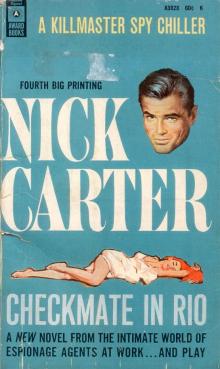 Checkmate in Rio
Checkmate in Rio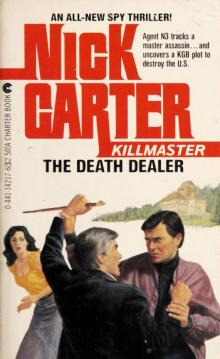 The Death Dealer
The Death Dealer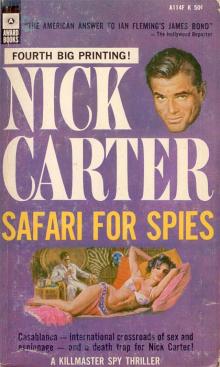 Safari for Spies
Safari for Spies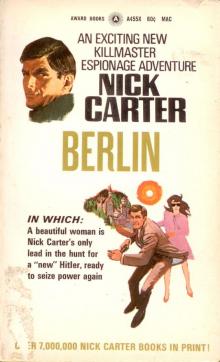 Berlin
Berlin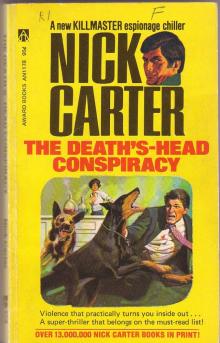 The Death’s Head Conspiracy
The Death’s Head Conspiracy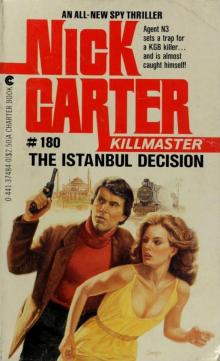 The Istanbul Decision
The Istanbul Decision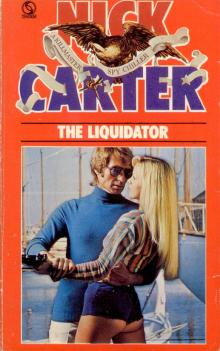 The Liquidator
The Liquidator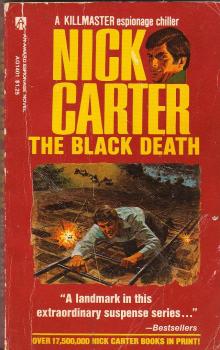 The Black Death
The Black Death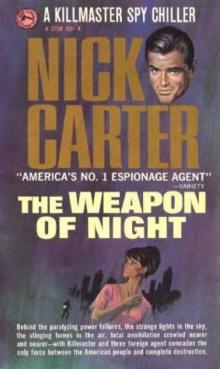 The Weapon of Night
The Weapon of Night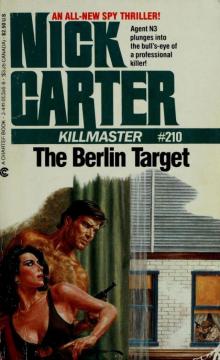 The Berlin Target
The Berlin Target Temple of Fear
Temple of Fear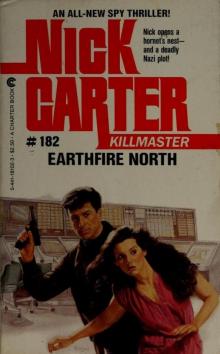 Earthfire North
Earthfire North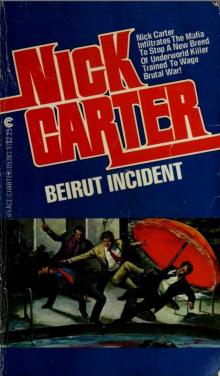 Beirut Incident
Beirut Incident White Death
White Death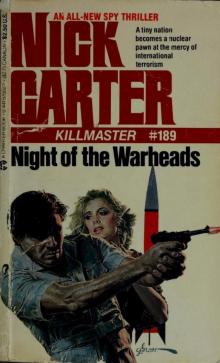 Night of the Warheads
Night of the Warheads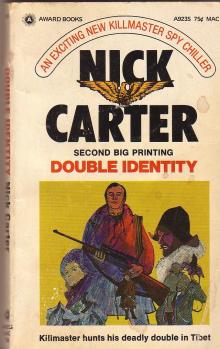 Double Identity
Double Identity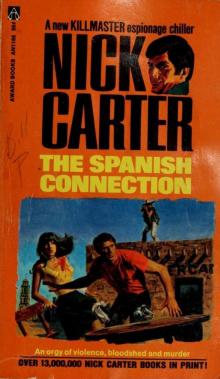 The Spanish Connection
The Spanish Connection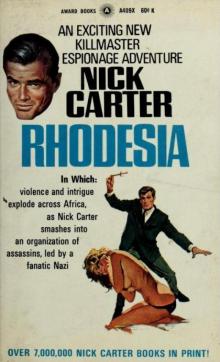 Rhodesia
Rhodesia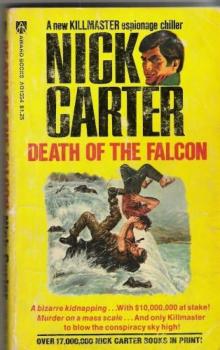 Death of the Falcon
Death of the Falcon The Executioners
The Executioners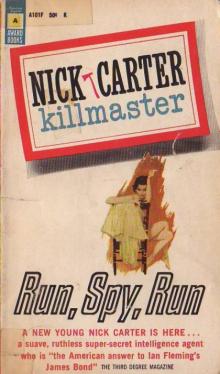 Run, Spy, Run
Run, Spy, Run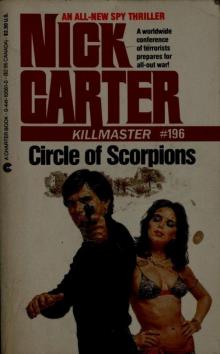 Circle of Scorpions
Circle of Scorpions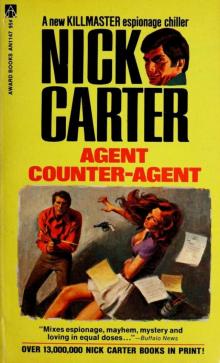 Agent Counter-Agent
Agent Counter-Agent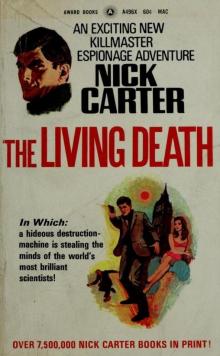 The Living Death
The Living Death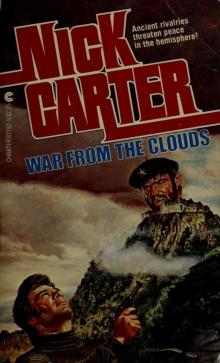 War From The Clouds
War From The Clouds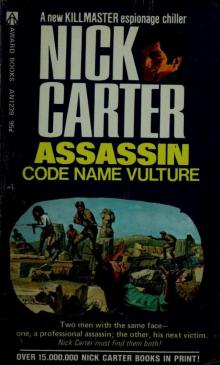 Assassin: Code Name Vulture
Assassin: Code Name Vulture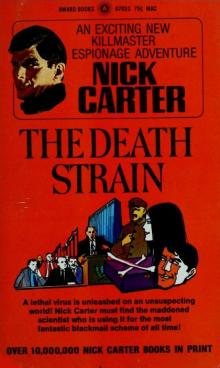 The Death Strain
The Death Strain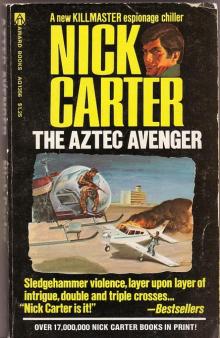 The Aztec Avenger
The Aztec Avenger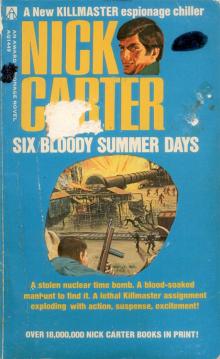 Six Bloody Summer Days
Six Bloody Summer Days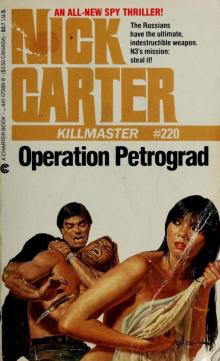 Operation Petrograd
Operation Petrograd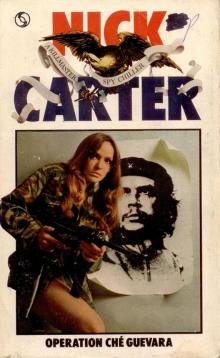 Operation Che Guevara
Operation Che Guevara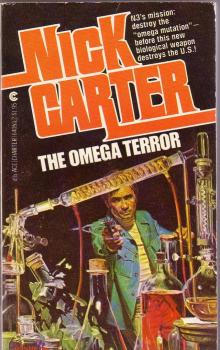 The Omega Terror
The Omega Terror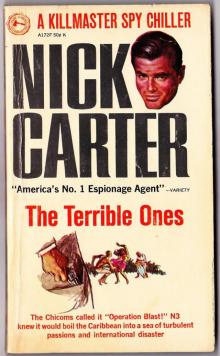 The Terrible Ones
The Terrible Ones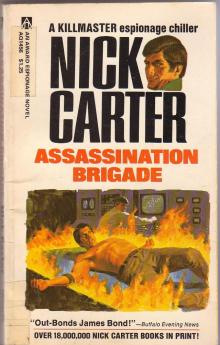 Assassination Brigade
Assassination Brigade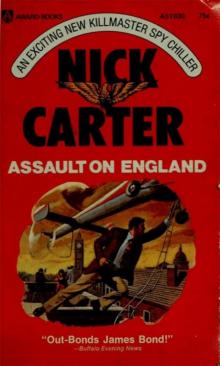 Assault on England
Assault on England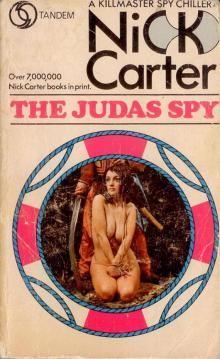 The Judas Spy
The Judas Spy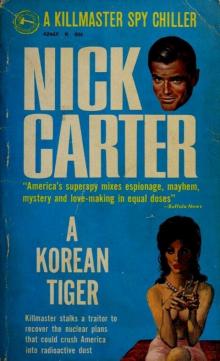 A Korean Tiger
A Korean Tiger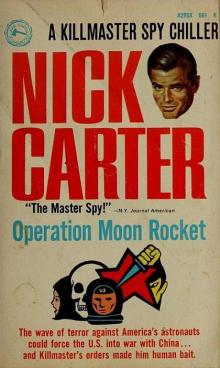 Operation Moon Rocket
Operation Moon Rocket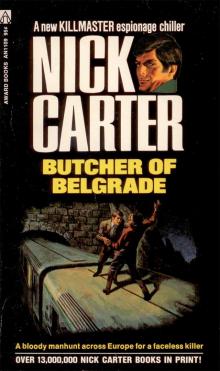 Butcher of Belgrade
Butcher of Belgrade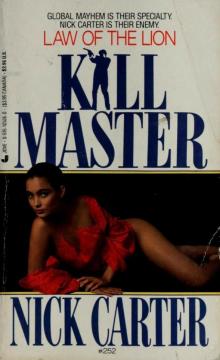 Law of the Lion
Law of the Lion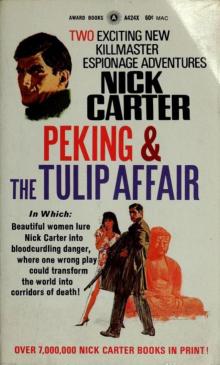 Peking & The Tulip Affair
Peking & The Tulip Affair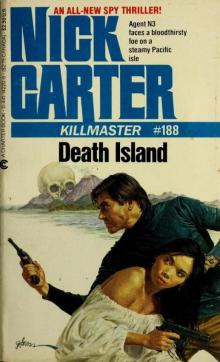 Death Island
Death Island The Jerusalem File
The Jerusalem File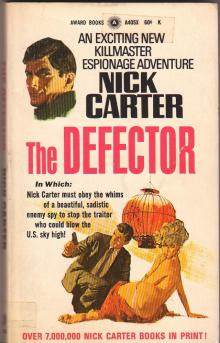 The Defector
The Defector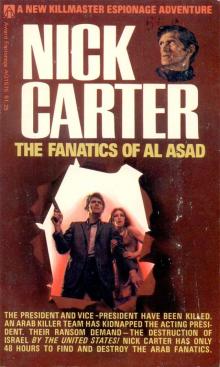 The Fanatics of Al Asad
The Fanatics of Al Asad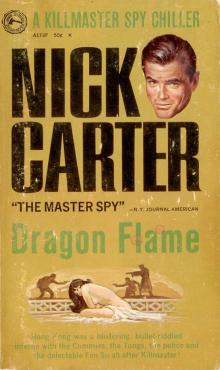 Dragon Flame
Dragon Flame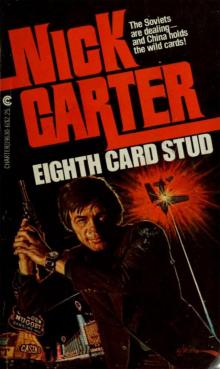 Eighth Card Stud
Eighth Card Stud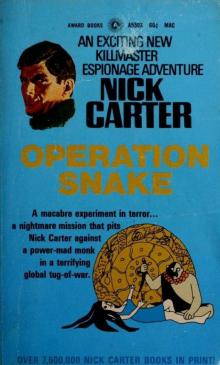 Operation Snake
Operation Snake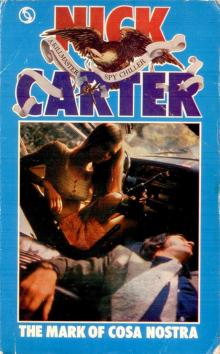 The Mark of Cosa Nostra
The Mark of Cosa Nostra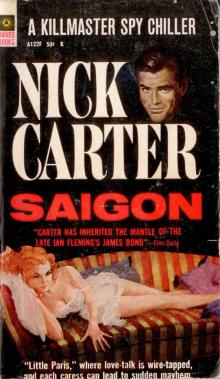 Saigon
Saigon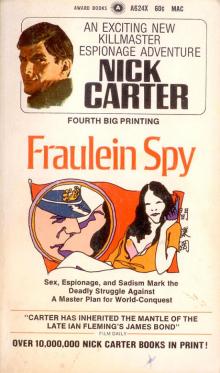 Fraulein Spy
Fraulein Spy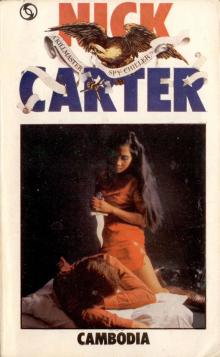 Cambodia
Cambodia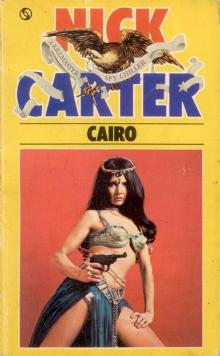 Cairo
Cairo